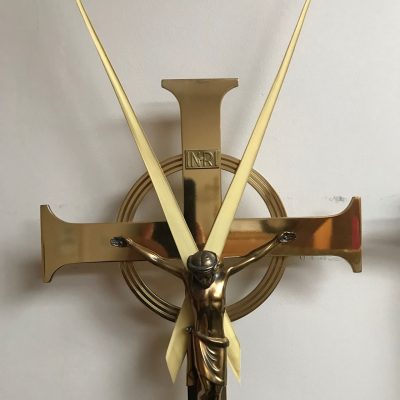 Loading…
Loading…
Scripture Relections
Prophet Isaiah 50: 4-7
The disciples of Jesus see this passage as being fulfilled in Jesus, by identifying the figure of the ‘suffering servant’ with the Lord, ‘for my part, I made no resistance, neither did I turn my back to those who struck me… I did not cover my face against insult and spittle’. Although the prophet Isaiah endured ridicule and suffering he can say, ‘The Lord comes to my help, so that I am untouched by the insults.’ This confident faith in God is in contrast to the opening words of the psalm that follows, although it too expresses trust and faith in God.
Responsorial Psalm 21 (22) – The prayer of the Suffering Servant
Letter of Paul to the Philippians 2: 6-11
‘His state was divine, yet Christ Jesus did not cling to his equality with God…’ Scholars recognise this text maybe an early Christian hymn or song. Paul quotes the hymn in support of his invitation to the disciples that they should follow in the way of Jesus. The hymn speaks of that Way, the abasement of Jesus, his humiliation, and then of his triumphant exaltation. ‘(He) emptied himself to assume the condition of a slave… being as all men are, he was humbler yet, even to accepting death.’ The ‘obedience’ of Jesus ‘even to accepting death, death on a cross,’ brings triumph and resurrection, and, ‘God raised him high and gave him the name which is above all other names.’ So Jesus Christ is acclaimed as, ‘Lord to the glory of God the Father.’
Passion of our Lord Jesus Christ according to Luke 22: 14- 23:56
Luke the evangelist takes us on the final journey of Jesus – from the familiar gathering with friends at the Last Supper, to loneliness in the garden at Gethsemane, and betrayal by Judas, the arrest and humiliation at the hands of Temple Priests, King Herod and the Roman Governor, then the final steps to crucifixion and death on Calvary.
‘When they reached the place called “The Skull”, they crucified him there and the two criminals also, one on the right, the other on the left. Jesus said: “Father, forgive them; they do not know what they are doing.” Then they cast lots for his clothing. The people stayed there watching him.’
We too are witnesses. What are we to make of these events as we join the passers-by who jeered: ‘He saved others… let him save himself if he is the Christ of God, the Chosen One.’ Should we join the criminal beside him, or the soldiers who mocked him: ‘If you are the king of the Jews, save yourself!’ Maybe, we might join the disciples who did not run away: ‘All his friends stood at a distance; so also did the women who had accompanied him from Galilee and they saw all this happen.’ Maybe they heard the words spoken by Jesus to the ones beside him on the cross: ‘I promise you, today you will be with me in Paradise.’ Then in the sudden darkness: ‘about the sixth hour and, with the sun eclipsed… Jesus cried out in a loud voice: “Father, into your hands I commit my spirit.” With these words he breathed his last.’
For me one very professional witness stands out. ‘When the centurion saw what had taken place, he gave praise to God and said, “This was a great and good man.”
© Peter J Harrison 2019

